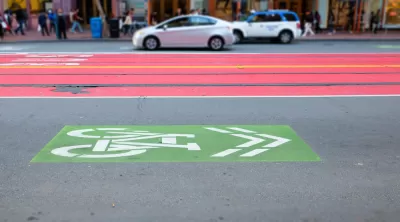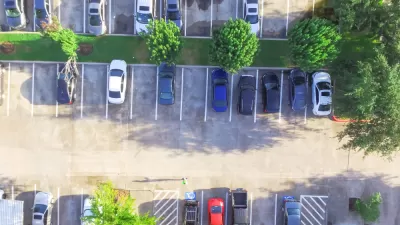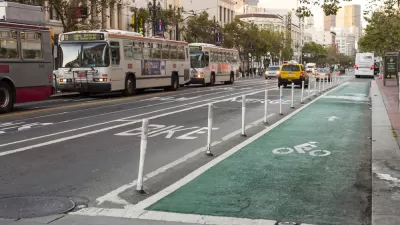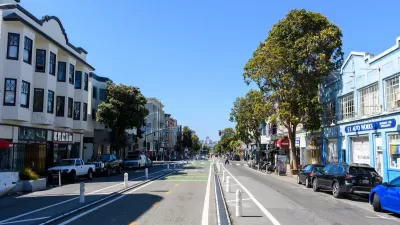Wondering what's on the agenda for bike advocates these days? The San Francisco Bike Coalition that just released a Strategic Plan that will direct political actions in 2018 and beyond.

The San Francisco Bike Coalition released a new Strategic Plan this week, providing a window into the ambitions of bike advocates as the world enters into the year 2018.
The plan lists four primary goals, each including an objective that furthers that goal and metrics that assess the success in attaining those objectives. Here's all four goals and a sample objective for each—more details can be found at the highly-readable online version of the Strategic Plan.
Demand high-quality infrastructure and push for visionary improvements to connect the city.
- Objective: Establish physically-protected bike lanes as the standard for bike improvements, especially on Vision Zero high-injury corridors.
Build public support and political power to win affordable and sustainable transportation for all San Franciscans.
- Objective: Ensure new and emerging mobility technologies and services, especially transportation network companies (TNCs) and delivery services, are safe and complement bicycling.
Grow, engage, and empower our membership to strengthen our organization and deepen community support for bicycling.
- Objective: Build an organization whose members, board, and staff reflect San Francisco’s demographics.
Introduce San Franciscans of all ages, identities, and backgrounds to the joy of bicycling and encourage more San Franciscans to bicycle more often.
- Objective: Educate all road users how to share the road safely and respectfully.
The Strategic Plan sets the agenda for the organization through 2022. The outreach that helped develop the plan included two forums, an open house, an online survey taken by over 900 members, prior to adoption by the organization's board.
FULL STORY: San Francisco Bike Coalition Strategic Plan 2018 – 2022

Planetizen Federal Action Tracker
A weekly monitor of how Trump’s orders and actions are impacting planners and planning in America.

Vehicle-related Deaths Drop 29% in Richmond, VA
The seventh year of the city's Vision Zero strategy also cut the number of people killed in alcohol-related crashes by half.

As Trump Phases Out FEMA, Is It Time to Flee the Floodplains?
With less federal funding available for disaster relief efforts, the need to relocate at-risk communities is more urgent than ever.

Texas Safety Advocates Raise Alarm in Advance of Tesla Robotaxi Launch
The company plans to deploy self-driving taxis in Austin with no oversight from state or local transportation agencies.

How to Fund SF’s Muni Without Cutting Service
Three solutions for bridging the San Francisco transit agency’s budget gap without reducing service for transit-dependent riders.

Austin Tests Self-Driving Bus
Autonomous buses could improve bus yard operations for electric fleets, according to CapMetro.
Urban Design for Planners 1: Software Tools
This six-course series explores essential urban design concepts using open source software and equips planners with the tools they need to participate fully in the urban design process.
Planning for Universal Design
Learn the tools for implementing Universal Design in planning regulations.
Borough of Carlisle
Smith Gee Studio
City of Camden Redevelopment Agency
City of Astoria
Transportation Research & Education Center (TREC) at Portland State University
City of Camden Redevelopment Agency
Municipality of Princeton (NJ)





























